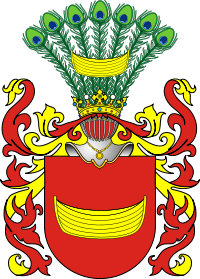Łukasz Opaliński (writer)
Łukasz de Bnin Opaliński (* 1612 ; † 1666 in Rytwiany ) was a Polish nobleman, political activist and one of the most important Polish writers and poets of the 17th century. He belonged to the Łodzia coat of arms community.
Life
From 1631 Opaliński held the post of Starost of Pobiedziska, the post of treasurer of Kalisz from 1638 to 1640 and finally that of treasurer of Poznan from the same year. From March 10 to May 1, 1638 he was Sejm Marshal in Warsaw and court marshal of the Polish-Lithuanian crown from 1650.
Opaliński received his extensive training at the Lubrański Academy in Poznan, the University of Leuven, the University of Orléans and also attended the universities of Strasbourg and Padua.
His marriage to Izabela Tęczyńska enabled him to take over the considerable possessions of her family. Since he was - like his brother - bibliophile, he enlarged his library, which he had inherited from Jan Tęczyński , an uncle of his wife Izabela. This library, which he expanded, was considered to be one of the largest private libraries in Europe and grew steadily thanks to his contacts with most of the book printers in Europe, from whom he mostly received first editions.
At the age of twenty he voted for King Władysław IV. Wasa in the 1632 election . As an active politician, Opaliński was a member of many Sejms and their committees (such as those on the military, finance and diplomacy). He criticized the golden freedom and spoke out in favor of reforms, including a reform of the Sejm's consultation procedures (in his work Rozmowa Plebana z Ziemianinem (...), 1641). He was against the Liberum veto and the abuse of power by magnates ( Coś nowego (…), 1652). After the death of Władysław IV. He supported the election of his brother John II Casimir as king. Against the Swedish invasion (the so-called " Swedish Flood ") he stood by John II Casimir even after his own brother Krzysztof Opaliński defected to the Swedish side in 1655.
In 1652 he was chairman of a Sejm tribunal which Hieronim Radziejowski banished for his collaboration with the Swedes during their invasion. In the Sejms, which met in 1661 and 1662, he was one of the supporters of a Vivente Rege arrangement, which was also favored by King John II Casimir. In 1661 he promoted the publication of the first Polish newspaper, the Merkuriusz Polski Ordynaryjny . In the same year he also published his work Poeta nowy , the first work in Polish on the principles of poetry. The invention of the woodske football variant is also attributed to him. He died in Rytwiany in 1666.
Works
- Rozmowa plebana z ziemianinem albo Dyskurs o postanowieniu teraźniejszym Rzeczypospolitej io sposobie zawierania sejmów (1641) (Conversation between a priest and a squire, or discourse on current activities in the republic and how the Sejm is formed) - published anonymously
- Polonia defensa contra Joannem Barclaium (1648, in Latin) (Defense of Poland against John Barclay) - an answer to Icon Animorum by John Barclay , which Opaliński viewed as a very unjust representation of Poland
- Coś nowego (...) (1652) (Something new (...))
- De officiis libri tres (1659) - textbook on ethics used and often reprinted by many Jesuit schools
- Poeta nowy (c. 1661) (New Poet)
annotation
In some sources, the year of his death is given as 1662.
Web links
- Plant Segments (Polish)
- Works by and about Łukasz Opaliński in the German Digital Library
literature
- Jacek Jędruch, Constitutions, Elections and Legislatures of Poland 1493–1993 , Hippocrene Books, 1998, ISBN 0-7818-0637-2 , p. 148
| personal data | |
|---|---|
| SURNAME | Opaliński, Łukasz |
| ALTERNATIVE NAMES | Opaliński, Łukasz de Bnin (full name) |
| BRIEF DESCRIPTION | Polish nobleman, political activist, writer and poet |
| DATE OF BIRTH | 1612 |
| DATE OF DEATH | 1666 |
| Place of death | Rytwiany |
